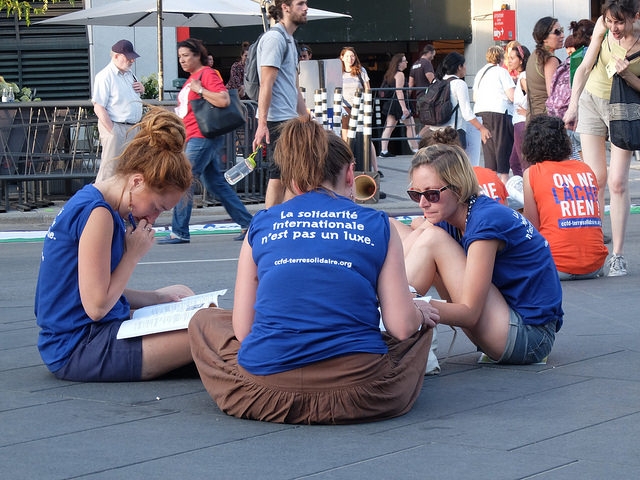
These past few weeks, we’ve met several young dynamic leaders at World Youth Day in Krakow, Poland and at World Social Forum in Montreal, Canada. Their backpacks filled with stories and experiences. They share with us why it is important for them to engage and act in the face of today’s social and environmental crises.
Climate change, environmental degradation, increasing social inequalities, persecution and criminalization of human rights, environmental and social movements, land-grabs, war… are widespread issues, the symptoms of a deep systemic crisis that affects the whole planet and our lives, particularly those of the most poor and vulnerable communities. In the face of these challenges, there is an urgent need to transit towards a more sustainable way of living and interacting with the planet and with other fellow human beings.
In the past few weeks, we’ve met youth, from different places and diverse backgrounds, who shared with us the reasons behind their engagement in different struggles related to climate change and environmental degradation. They talked to us about why it is important for them to act in their communities, while engaging in global struggles and mobilizations, creating bridges and long-term, flourishing exchanges with other movements and actors to build and promote concrete alternatives and sustainable ways of living. They stressed how participating in global events and dedicating spaces for the youth can enable fruitful connections based on solidarity.
Watch their stories below:
– Igor Bastos, Juventude Franciscana do Brasil and member of the Global Catholic Climate Movement (GCCM), Brasil
“We live in a moment in which it is necessary to act and, in this light, we need primarly the strength of the youth, the capacity of youth to mobilize, the capacity of youth to change and keep moving, and to take action in different struggles that are affecting our planet and our lives (…) There are different spaces where we are invited to be present in, not only with individual or personal lifestyle change, which are important, but also with collective and global engagements.”
Video here.
– Sam Ath Kim, Publication and Communications Manager, Youth Resource Development Program, Cambodia
“In my country, the youth make up the biggest portion of the population. Youth are the core pillar of our society. They are the future leaders of the country. That’s why we need to educate youth (…) When youth have social concern, they can help educate, they can help promote climate change reduction and environmental preservation in the country. I believe that youth can make a positive change. We are part of the problem, and that’s why we are also part of the solution.”
Video here.
– Allen Ottaro, Executive Director of the Catholic Youth Network for Environmental Sustainability in Africa, CYNESA, Kenya
“As young people we have the right to demand our leaders to take action and be mindful of the present and also the future. But every right comes with a responsibility to find ways to act within our local communities, where we can show leadership, where we can engage with our peers, and how we can build intergenerational solidarity – we need to be in dialogue with our elders, to learn about the mistakes already made, to avoid making them again.”
Video here.
– Janelle Delorme, Regional Animator at Development and Peace, Manitoba – Canada
“It’s a critical time for youth and young adults to develop their values and to align their values with actions (…) The youth bring new energy and fresh ideas for action. The Youth Space at the World Social Forum also allows for youth who may have felt that they don’t have a voice, that they can hace a voice, and go back to their regions and countries to share and educate others, find that voice and know that they can change the world. It can be small actions, it can be big actions…”
Video here.
